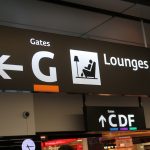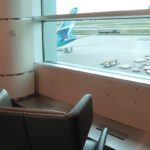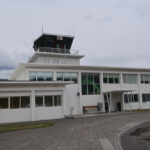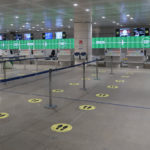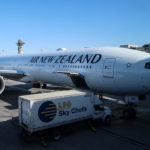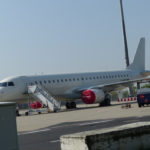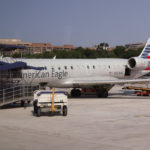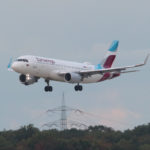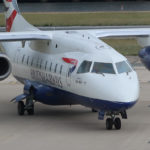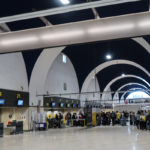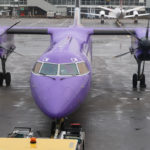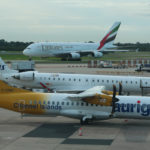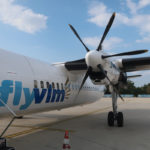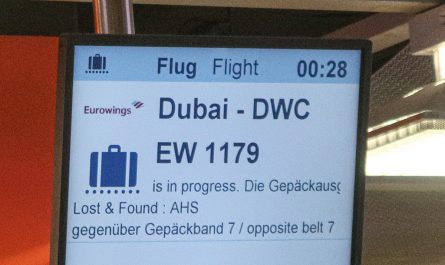I recently told you about my very different pandemic and post-pandemic (re)booking experience with different airlines. The level of service given to the customer is very different, as you see there. Some airlines (definitely not only the ones I mentioned in the post) thereby break aviation regulations. The strongest and most important for me are the European Flight Compensation Regulation (or sometimes reffered to as European Passenger Rights). I feel that they are a great way to strengthen the rights of flight passengers – but on the other hand, it is too easy to airlines not to apply it. In this posting, I sum up, how I would change them.
Covid-19, Strikes and more – My Flight Rebooking Experience
I have to clearly state that I am not a lawyer. Some of the changes I suggest may not be compliant to European or international law, e.g. that the regulation applies to all flights passing the European Union.
Flight Compensation Regulation in a Nutshell
I just give you the very basic of the Flight Compensation Regulation, which is legally referred to as EC No 261/2004). Others just do it better than me – I refer to the website of the European Union or the corresponding Wikipedia page if you feel for more details.
Roughly, EC 261/2004 works as follows:
- The regulation applies for any flight starting from the European Union (EU) / European Economic Area (EEA) state and for any flight into the EU/EEA driven by airlines based in one of their member states. Switzerland and Norway applied to the regulation as well.
- A flight may thereby contain several legs.
- You need to have a confirmed reservation on a rate available to general public. Award flights are included this, other promotional rates (e.g. travel industry rates) do not count. In addition, the flight ticket must not contain helicopter flights, flights with fixed-wing aircrafts or a flight from Gibraltar Airport (GIB).
- In case your flight is cancelled, you in general have the right to be re-routed to the next available flight with a comparable service, use the ticket at any later point in time or request a full refund.
- In that case and depending on the total flight distance, you additionally receive 250/400/600 EUR. However, the airline does not have to pay the compensation if
- The re-booking happens two weeks before the flight
- The re-booking happens later, but they re-book you in a way that you have just slightly different arrival times at your destination. In that case, you may still receive a reduced compensation
- the cancellation was caused by extraordinary circumstances
- Any compensation has to be paid in cash or bank transfer. The passenger may accept vouchers, but does not have to do so. The compensation is meant to cover all your costs related to the delay. You cannot claim a higher rental car rate due to re-booking on top of that, for example.
- Airlines have to make you aware at the check-in counter by a display about these rights
There are also numerous other regulations, e.g. the obligation of the airlines to provide communication, accommodation and meals, depending on the circumstances. There are also clear rules in case of operational downgrades (e.g. you booked a business class ticket and have to fly economy).
Why I feel that the Regulation doesn’t work
It is not only part of my personal experience, but common sense in the aviation community that airlines pay significantly less compensation than they should do. There are two reasons for that:
- We, the passengers, are too lazy to go to court. I guess that already quite a lot of passengers, who had the right for a compensation, don’t claim it. However, depending on the airline, you regularly receive a decline from the airline, which is wrong from a legal standpoint. You have to go to court. You will very likely win the trial in that situation. However, people just don’t do it. Thus, it is economically very sensible for airlines to “cheat” their customers – even if a trial was expansive, it just happens too rarely.
- I already used the wording “cheating”. Airlines also try to make you aware that EC 262/2004 is not applicable for your ticket. That is the typical way the decline of your request for compensation is working out. Typical examples are:
- The most frequent method is claiming an extraordinary situation. Courts more and more defined (and limited) what is falling under this situation. Finally, there are just events like medical incidents to a passenger, very adverse weather or other really adverse situation. Vice versa, technical issues with the plane or limited availability of airline staff, including events like strike, do not count.
- They try to state that the ticket is in fact not in line with the regulation. I was surprised when Lufthansa bring that up twice in 2022 with an award ticket, i.e. a ticket paid with miles
- They try to argue that the delay was shorter than you claimed it. This just happens in very tight situations. However, the most common definition is that you compare your originally scheduled arrival time with the time the airplane door is opening at the gate or parking position. Please note that this may be significantly later than the plane touching the ground, e.g. when a parking position is not available. Vice versa, the Flight Compensation Regulation for example does not allow you to claim a compensation if you wait extraordinarily long at an immigration line or when your luggage is arriving very late / not at all.
- Last, but not least, airlines tend to simply not to reply or to at least delay the process significantly. There are some regulations that they should react within a week roughly – but some airlines tend to make you wait two to three months, even if you are a frequent flyer with them. Again, you unfortunately have to mention Lufthansa in that context.
My Thoughts How to Change the Situation
To me, there are four classes of changes, which I feel should be changed, so that the Flight Compensation Regulation is in fact a rule, which is supporting the passenger in a fair, sensible and comfortable way and not leading to a situations where some airlines are doing nothing but aiming for lawsuits, which likely never happen. In addition to the four points below, I would favor that any flight, which is departing, arriving or including a transfer in the EEA is impacted by the regulation. I recently had a significant delay on a Lufthansa flight from Tirana Airport (TIA) to Frankfurt (FRA). While some people missed their connections in Frankfurt to European destinations (and were thus covered by EC 261/2004), a few missed their flight to the US and had to fly the next day. As Albania is no part of the EEA (and USA, of course, not as well), they did not receive compensation and even did not have the chance to at least cancel and refund the flight. I feel this is very unbalanced. But as it is touching international law, I just decided to concentrate on the points below:
Airlines have to declare and proof a Force Majeure Incident
I know that reversing the burdon of proof is a very critical legal demand. Without the presumed innocence, we still might have lawsuits like burning of witches in Europe. But on the other hand, once an airline is declaring a force majeure / extraordinary circumstance, the passenger is in a very unfortunate position. One of the key weak points of the regulation is also that there is no list of possible events which is splitting them into operational risks and decisions – and those events which are (in regards of the regulation) are out of control of the airline.
Thus, I feel that the only way to significantly ease the position of the passenger is to expect by default that there the flight delay has not been caused by an extraordinary circumstance. If the airline feels that a delay might be out of their responsibility, they have to declare explicitly and give the reasons for it, including a reference to the (hopefully, future) list of events. Ideally, I would love to have this checked by an authority (e.g. the national aviation authority). This might sound like a hell of work for this unit – but finally I feel that most of this class delays caused can be processed very quickly, e.g. because they are caused by bad weather, medical incididences or similar events.
Definition of a Delay Event
I feel that another very weak point of the EC 261/2004 is that it is not really clear what a delay of a certain duration is. I give you some examples of a (bit of messy) flight.
- The (example) flight from Warsaw (WAW) to Frankfurt was expected to land at 9:30 hrs
- The plane touched down at 11:00
- The parking position was blocked. Thus, the flight had to wait and reached parking position at 11:25
- Due to a lack of staff, the jetbridge came late and the front door has been opened for deboarding at 11:40.
- Luggage handling was lame. The first bag arrived at the belt on 12:20, the last one at 12:35
You can easily find a (typically, precise enough) time for the touch down point in time on platforms like flightradar24. You may also reconcile when the plane reached its final parking position in a way that you can use it at court. The opening of the jet bridge and luggage handling is typically much harder to proof (there are ways to do it, though, as well). The typical definition of the delay, by the way, is the opening of the first plane door. Thus, in this example, the place had a delay as defined in the regulation. But it is not explicitly given in there.
Especially luggage handling has been a huge issue during the last years and may finally lead to the same effect for passengers like plane delays. Vice versa, you could argue that people traveling with carry-on luggage only have a disadvantage here. In addition you would have to define a target delivery time for luggage and add it to the two / three / four hours That’s a very difficult discussions. If you think of flights from Europe to the USA, immigration waiting times could also have similar effects. Regardless which definition you favor, I guess that many of you will agree that a clear definition of the end of a flight would be helpful.
Information and Communication
During the last three years, I saw a wide span of service attitude in regards of the information of a cancellation or a delay in regards of the reason and the compensation options. Thus, I feel that EC 261/2004 should also set communication standards.
- Already at the departure airport and in the plane, the airlines shall be obliged to give the reason for the delay and if there is the potential for extraordinary circumstance event.
- This information shall be given as a written information (e.g. by text message or e-mail) about any flight delayed by at least one hour
- Similarly, when an airline is refusing to give you a benefit defined by the regulation, they shall give you a written version of the reason why they decline (again, by e-mail or similar), even if you have contacted them personally (e.g. at a ticket counter) or by chat or phone.
The rationale for that is that Is saw that airlines tend to give you wrong legal information. As you see in the posting I stated above, Lufthansa twice explicitly told me that EC 261/2004 is not valid for award tickets. It is very hard to proof reasons given you by the phone. Thus it feels that some airlines want to have you on the phone, as the burden of proof is much more difficult.
Automated Processes and Strict Timelines
I discussed a bit above that regulation on the communication of airlines in case of delays feels to be very essentional to me. Unfortunately that does not solve one issue: if you are on the phone with a call center, some airlines obviously train their agents to hang up in certain situations. Thus, I feel that you also need to have better rules how quick airlines have to response and in what is happening in case of very short notice cancellations.
I would also try to urge airlines to have automated systems until a certain point in time. While I need to call British Airways maybe in one out of four cases of a flight delay or cancellation and can deal with all other issues in their excellent online tool. Lufthansa is practically forcing you to call them – which leads to massive queues, even for higher class status flyers. Finally, their system feels to be designed to de-motivate the passenger to pursue his/her rights more and more over time by delaying the process. That is unbearable in my point of view. You also need timelines in regards
Aviation on Flyctory.com
Here are all postings about Airports & Airlines:

In December 2025, wife and I flew from Phoenix Sky Harbor Airport (PHX) to Calgary (YYC) on a Westjet flight ...

My recent two day trip to Dubai was meant as a mileage run, i.e. a trip which is majorly meant ...

A short, three hour transfer from Phoenix (PHX) to Amsterdam (AMS) gave my wife and I an international transfer in ...

Flying into Tokyo typically comes with two airport options. In the Northeast of the Japanese capital, there is the airport ...

I had quite a lot of interesting flights during December 2025 (and the beginning of January 2026),. Thus, there are ...

Before flying with Southwest Airlines from Las Vegas (LAS) to Albuquerque (ABQ) in December 2025, I had the opportunity to ...

Despite being a Flying Blue Platinum member since a while, all the business class flights I had with Air France-KLM ...

I had quite a lot of travelling during November 2025. Thus, it feels like perfect time for a new episode ...

Like at most Spanish airports, the lounges are driven by the Spanish Aviation authority AENA. During my September 2025 trip ...

My American Express Platinum card offers me access to a couple of lounges driven by the credit card provider. After ...

My September 2025 edition of the Food I Had Onboard already starts with some experiences in late August. Again, there is ...

Overall, I had significantly more plans to explore places and sights on the Faroe Islands during my trip last week ...

Even though I have a long list of flights to and from London Heathrow Airport (LHR), my history with Terminal ...

A missed connection or a suitcase not making it - there are numerous ways how things could go wrong while ...

The best (i.e. most economic) way to integrate a day in Charlotte, North Carolina, to my Six US States and Nashville trip ...

I don't have that many flights during the summer season. Thus, the frequency of my Food I had Onboard posts is getting ...

Visiting a friend's musical performance in late June 2025 did not only give me my very first flights to and ...

Dusseldorf Airport (DUS) used to be a great place for plane spotters and aviation geeks. Two visitor terraces, one at ...

Istanbul Airport (IST, Turkish: İstanbul Havalimanı) opened in 2018, mainly in order to strengthen the global role of Turkish Airlines ...

After two Weird Al Yankovic shows in June 2025, it was time to fly home. As American Airlines, who took ...

As the Pearl Lounge in Abu Dhabi Airport (AUH) is contracted to Qatar Airways and Sri Lankan Airways, I visited ...

It is more than a month ago since we all had a certain focus on Ahmedabad in India. Air India ...

In late May 2025, I added another smaller US airport to my flight log. Typically, I visit these places due ...

In late June 2025, I had my 210th airport experience. Going to Brighton in Southern England, the early morning KLM ...

Two trips to the United States, including my 6 US States and Nashville trip and a short hop to see ...

I am a transport and aviation nerd. Thus, it might not be too surprising that one of the key motivations ...

The name Centurion Lounge is just located in comparably small letters at the side of the staircase - the credit ...

Returning from the Swedish Floorball Finals in April 2025, I chose a Eurowings flight from Stockholm Arlanda Airport (ARN). While ...

Due to my new job, I did not travel that much and worked quite a lot from home instead. However, ...

It's already quite a while ago since I shared my view on Dubrovnik Airport (DBV) with you. However, I did ...

I had the idea to this post when I sat in the American Airlines Admirals Club at Pittsburgh Airport (PIT), ...

On my recent twelve Air France and KLM mileage run in January 2025, I also had one night in Malaga ...

Having a Thursday evening flight with British Airways gave me a comparably rare opportunity for a lounge review at my ...

After I already took you on a Visitor Tour through Munich Airport (MUC) in a previous post, here is another ...

In October 2024, I flew from Jakarta (CGK) Terminal 3 back to Abu Dhabi (AUH) via Colombo (CMB). The SriLankan ...

22 - a repdigit and thus a small anniversary in my Food I Had Onboard series. I have to admit that some ...

During my Pittsburgh Penguins trip in February 2025, I had a Contour Airlines flights, based on the Essential Air Service ...

After I shared my loyalty portfolio thoughts in March 2024 with you, it is time for an update. Especially the ...

Flying Eurowings in the A320neo from Cologne/Bonn (CGN) to Dubai World Central (DWC) did not only give me my first-ever ...

The Essential Air Service program, a state-funded scheme to subsidize aviation in more remote and less developed areas, already brought ...

With my recent mileage run and the trip to the World Floorball Championship Qualifications in Italy, I had quite a ...

I have been at the Schengen Austrian Airlines Senator Lounge in Vienna (VIE) so many times the last years. However, ...

In addition to the non-Schengen services at Terminal 1, Terminal 2 of Prague Airport (PRG) offers two lounge options. I ...

Dubai World Central (DWC), also Dubai Al Maktoum International, is Dubai's future hub in the making, according to the official ...

While quite a lot of traveling is ahead of me during the next weeks, November and December 2024 was rather ...

In the frequent traveler community, especially in and around Germany, the middle distance Eurowings flights gained quite some popularity. Flights ...

Flying Qatar Airways Business Class from Belgrade (BEG) to Doha (DOH) gave me a rather rare experience. While I already ...

The lounge Josh Cahill made famous - the Privilege Lounge at Tunis Airport (TUN) once made a devastating YouTube video ...

Being on some sort of Lufthansa farewell tour after I decided not to prolong my Senator status gave me an ...

Spending some time in and around Munich Airport (MUC), I also took the opportunity to have their Airport-Live-Tour, the basic bus tour ...

After I already introduced you to my good Saudia Boeing B787 Dreamliner experience, I still owe you the second part ...

Exactly eight years ago, I flew SAS Scandinavian flight SK 626 from Dusseldorf (DUS) to Copenhagen (CPH). Not a really ...

Four flights with SriLankan Airlines - the national aviation provider of the Asian state was the backbone of my travel ...

While my 18th edition of the Food I Had Onboard just came with a limited number of trips rather widely ...

My October 2024 trip, featuring multiple flights and airlines from Germany to Jakarta, came with one major highlight. Qatar Airways ...

In February 2024, I had my first flights with Saudia Arabian Airlines. The flights from Tunis (TUN) and Jeddah (JED) ...

Before my flight back with Saudia Arabian Airlines from Kuala Lumpur (KUL) in late February 2024, I expected to have ...

Even though I already had a couple of flights from Newcastle Airport (NCL), I never shared my lounge experience from ...

I did not have that much traveling during the last weeks - but as some major trips are ahead, I ...

My Firefly flights in Malaysia to and from Subang Airport (SZB) also offered me to explore a new lounge. The ...

On my recent trip to the Tennis Hall of Fame Open 2024 in Newport, I had British Airways and American ...

Having a 1,000 EUR business class flight with Saudia to Kuala Lumpur just felt too tempting for me. The downside ...

Oh, I traveled too much the last weeks again. Time for another Food I Had Onboard posting - this time also featuring ...

Myrtle Beach in South Carolina is definitely a special place to me. The city on the Atlantic coast is full ...

When I traveled to Malaysia in February 2024, I was really curious about Johor Bahru. The city in the South ...

During my early 2024 trip to Malaysia, I had domestic ATR 72 flights with Firefly. The key hub of the ...

I had quite a lot of travel in recent times - so there is time for a new Food I Had ...

The history of Berlin nowadays is also a story of two airports which have been closed down in the meantime ...

Krakow is one of my favorite places in Poland. While I also took the lengthy train ride from Cologne once, ...

In my fifteenth edition of my Food I Had Onboard posting series, I have a quhttps://flyctory.com/tag/deutschebahn/ite nice range of flight and ...

Opting for American Airlines over British Airways when flying from London-Heathrow (LHR) to the United States has a key advantage: ...

In December 2022, I had my very first visit to Albania. The trip was, of course, by air, so that ...

During my trip to Malaysia in February 2024, I wanted to try out some travel experiences. The intention thereby was ...

On a business class trip with Finnair from Lissabon (LIS) to Helsinki (HEL), I had the opportunity to check out ...

A roughly eight hour transfer time in Jeddah (JED) - some people would not have booked the trip I took ...

In early April 2023, I gave you an insight into my loyalty program strategy for 2023. The posting Thumbs up ...

France, Tunisia, Saudi Arabia and Malaysia - I am just coming back from a massive aviation trip, which is the ...

I am very likely not prolonging my Lufthansa Senator status after it expires in February 2025. Thus, when my wife ...

The Faroe Islands have definitely made it deep into my heart during 2023. While there is the Smyril Line ferry ...

After I had already flown the Airbus A320 simulator by Aerotask in Essen, I was really looking forward to my ...

I love historic planes and explore the feeling of flying in a historic manner. For example, I am really happy ...

Happy New Onbaord-Food Year! At least, there is one flight experience from 2024 in this posting already, a Lufthansa Business ...

As my trip to the Faroe Islands in September 2023 was on two split tickets, a SAS one from Dusseldorf ...

Flying to from Budapest (BUD) to New York in late October 2023 came with two really nice perks. First of ...

After my eleventh Food I Had Onboard posting majorly concentrated on two Lufthansa First Class legs between Frankfurt (FRA) and ...

In July 2023, I did a try-out flight with Air France and KLM, exploring whether they could replace German carrier ...

Yeah, I am a bit of nerdy, but one thing I was looking forward about flying Lufthansa First Class from ...

What sounds better like having a beer or two (or three....) while you are waiting for your flight in the ...

I felt it is a good time to publish my next episode of Food I Had Onboard in this week in ...

As far as I had in mind, there used to be two business lounges at Krakow Airport (KRK). The more ...

In late July 2023, I have been checking out some of the services of KLM and Air France, testing if ...

While I used the ferry some ten years ago to visit the Faroe Islands, I was really flattered to fly ...

When Swiss International Air Line recently released the seat map of their new Airbus A350 fleet, a real advantage of ...

I love small regional air service like the Essential Air Service in the USA or flights to small and rather ...

Are we really in the double digits now? I am really happy about my "new" category Food I had Onboard. Also, ...

Aiming to intensify my travels with the oneworld Alliance members also leads to a more frequent visit of their business ...

Having a mileage run via Marrakesh was just the second time I set foot on Moroccan soil. Like at the ...

The first day of our Iceland Ring Road trip brought my wife and I to the Air France / KLM ...

After I introduced you to the Boeing 757-200 Saga Premium Class, the premium product of Icelandair, in 2021, I felt ...

If you have a Schengen flight from Madrid Barajas Terminal 4 and fulfill the requirements, you typically relax at the ...

One more Food I had onboard until I have a full set of ten postings. Hope you also enjoy reading ...

The Aspire Lounge at Manchester Airport (MAN) Terminal 2 is in fact the third Aspire Lounge I introduce you to ...

Visiting Cyprus in October 2022 was definitely one of the highlights of my previous year. I fell in love with ...

Due to the geographic situation of the Croatian coast, which is very long and thin along the Adriatic Sea, there ...

Especially with British Airways moving the vast majority of their operations from B-Gates to C-Gates, I have been frequently visiting ...

Oops, I did it again. Just within about a month, I feel that I had a nice volume of flights, ...

I am really curious about Alternate Essential Air Service (AEAS) flights within the USA. They typically connect "less developed" areas ...

Primeclass is a global franchise of airport lounge operators. During our Croatia Airlines flight from Dubrovnik (DBV) to Frankfurt (FRA) ...

A major part of optimizing your travel portfolio is to determine the loyalty program which suits best to you. Thereby, ...

The last legs of the 2023 Weird Al Yankovic European Tour, Rock of Ages shows, the Pittsburgh Penguins and many ...

A paid upgrade in March 2023 finally gave me the opportunity to try out the "new luxury" of British Airways: ...

Already in 2018, I introduced you to my thoughts about Manchester Airport (MAN). To sum it up: the airport has ...

My March 2023 flights to some Pittsburgh Penguins matches had a nice highlight from an aviation point as well. For ...

A short stay at Marrakech Airport (RAK) in January 2023 gave me a couple of debuts: first of all, it ...

Wow, it's already half a dozen of episodes. This time, I start my Food I Had Onboard posting with two ...

In the pre-Covid-times, I had quite a lot of good experiences with Air Nostrum, the main regional carrier of Iberia ...

Before our Lufthansa Business Class flight back from Larnaca Airport (LCA) to Frankfurt (FRA), my wife and I had the ...

Even though one of my early Flyctory.com posts was about my B777 Singapore Airlines First Class experience, it took me ...

Dud you ever feel like learning more about the current operations and future plans of Germany's largest airport? Frankfurt Airport ...

The (most of the times) good thing about exploring a new airport? Right before you leave, you have the opportunity ...

This airport is likely one of the least frequented airports in Europe with regular scheduled services. You just have the ...

Time for another episode of Food I had onboard. Between September and November 2022, I had some really interesting experiences, ...

On my way back from the 2022 Lillehammer Tennis Davis Cup tie of Norway hosting India, I went back home ...

Unexpected encounter in October 2022: right when I was about to have my first Eurowings Discover intercontinental flight to Tampa ...

Flying back home from a Rock of Ages show weekend in Inverness in the Scottish Highlands, I was really amazed ...

Traveling through the United States, having the opportunity to try out Essential Air Service connections is also a nice add-on ...

Our October 2022 trip to Cyprus lead to an outbound connection from Germany to Larnaca (LCA) with Austrian Airlines. It ...

The OFD (Ostrfriesischer Flug-Dienst) is a regional airline, which is specialized in connection the German North Sea islands. Being part ...

Already the fourth edition of my Food I Had Onboard category. Even though my Covid-19 infection changed quite a lot of ...

Malta was the destination of choice for my wife and myself during Easter 2022. Staying at the Hilton Malta, we ...

Traveling to the Scottish Highlands - a Rock of Ages musical trip in August 2022 lead to a trip quite to the ...

Tupelo, birth town of Elvis Presley. I felt very flattered that I would make it back to the city during ...

While flying British Airways from Amsterdam-Schiphol (AMS) in July 2022, the British Airways Lounge had still been closed for refurbishment ...

Icelandair Domestic, Air Iceland Connect or Flygfelag Islands - the inter-Iceland aviation connections nowadays driven by Icelandair have different historic ...

New York LaGuardia Airport (LGA) is not regarded to be the nicest way of air traveling in and around the ...

Old lounge, new lounge: after Lufthansa decided to terminally close down some of their lounges, the company Global Lounge Network ...

If you are not a general aviation pilot and "just" an aviation nerd or traveler, flying Helgoland Airport (HGL) is ...

The seventh day of my Pittsburgh Penguins trip in March 2022 lead me to Marion, Southern Illinois. The local Veterans ...

After my second posting about Food I Had Onboard in mid March 2022, I had a couple of interesting flight experiences ...

I have to admit that I did not become too much of a friend of Malta during our four night ...

In summer 2021, I had a weeekend in Graz in Styria, Austria. Apart from meeting a wonderful friend again, I ...

Flying back in the Finnair Business Class from Dubai International, Terminal 1, to Helsinki Airport (HEL) has not been the ...

Before heading to the United Arab Emirates in February 2022, flying with Finnair from Helsinki Airport (HEL) to Dubai (DXB) ...

There is currently some effort to establish regular international flights from Akureyri (AEY) again, but in general, if you approach ...

After I got some quite nice feedback about my first Food I Had Onboard posting, I felt to continue this ...

When I flew Finnair from Stockholm-Arlanda (ARN) to Helsinki (HEL) the last time in 2019, the Finnish airline has been ...

For our trip in late summer 2021 to Gdansk in Poland , my wife and I arrived in the city ...

Icelandair gave me a very short-term cancellation for my flight to Vestmannaeyear, when I visited the island. However, I definitely ...

There are a couple of LOT intercontinental flights from Warsaw Airport (WAW) in my flight log. Based on that, I ...

Flying from Toronto City - or: Billy Bishop - Airport (YTZ) during my September 2021 trip was definitely one of ...

Flying from Reykjavik Domestic Airport (RKV) was thought to be one of the highlights of my trip to Iceland in ...

I so far did not have too many opportunities to cross the Polar Circle in my life. A few years ...

In late August 2021, I flew back from Salzburg Airport (SZG) to Dusseldorf Airport (DUS) with Eurowings. My BizClass ticket ...

I had a couple of trips to Salzburg and neighboring areas in recent past. While some have been rail trip, ...

While Lufthansa operated their flights from the Emirates Terminal 3 during the Covid-19 flight reductions, I was quite happy to ...

Even though I do have a couple of airport reviews on Flyctory.com, I so far missed a lot of the ...

In October 2021, on a flight from Munich (MUC) to Keflavik Airport (KEF), I decided to go for a new ...

As Munich Airport (MUC) is one of my most traveled ones, I know the business lounge situation there quite well ...

As part of my Condor Business Class experience from Toronto Pearson (YYZ), Terminal 3, to Frankfurt (FRA), I also had ...

South Tyrol, the German speaking region in Northern Italy is quite popular among tourists. The Dolomite Mountains attract many people ...

I already introduced you to the lovely regional airport of Lübeck (LBC), a city some one hour Northeast of Hamburg ...

Flights directly from city to city - needless to say that one key driver of success of Billy Bishop - ...

For my trip to Canada on the day they re-opened their borders after Covid-19 restrictions I went for Condor. I ...

Friday, the 13th... On 13th August 2021, I was scheduled to have my very first Boeing 737-MAX flight. Icelandair from ...

In August 2021, I finally visited a place which has been hidden from me for so long. I had so ...

What is happening if you are running and airport and you just don't fine an airline which is motivated to ...

In Iceland, Akureyri is called the Capital Of The North. Excluding the Reykjavik Metropolitan Area, it is the largest city on ...

I remember having a flight from Lübeck / Lubeck Airport (LBC) in the very early 2000's. At this time, I ...

Due to the pandemic travel limitations, I felt 2021 might be a good idea to check out some exotic travel ...

During the later phases of the Covid-19 lock-downs in Germany, I had the idea to that posting. Maybe just because ...

I recently reviewed the DB Lounge / German Rail Lounge at Frankfurt Airport. I could somehow copy and paste major ...

Millions of tourists just cannot be too wrong: after Madrid Barajas (read my review of Terminal 4) and Barcelona El ...

Majorly in order to check out the DAT (Danish Air Transport) connection from there to Hamburg, I happened to fly ...

Even though I had to delay my flight from there for medical reasons, I was really excited to have my ...

My December 2020 trip to Gran Canaria / Grand Canary has been the first longer distance trip since quite a ...

When people discuss about good airlines for US domestic travel, Alaska Airlines is very frequently mentioned. Thus, I was really ...

There are a lot of discussions in Germany whether domestic flights are really necessary - and the argues against them ...

I originally planned a flight to the new Berlin Brandenburg Airport in late October 2020. Due to all the pandemic ...

Fortunate unexpected upgrade: I originally planned to go from Paderborn/Lippstadt (PAD) to Westerland/Sylt (GWT) to check out a new German ...

Travelling in Germany has been turned down to an absolute minimum. Hotels are just able to accept business guests and ...

In April 2021, I finally had my first flight connections to/from the new Berlin airport, BER - Berlin / Brandenburg ...

Despite the limited travel situation in Germany due to Covid-19, there are some quite interesting virtual airline projects in Germany ...

The city of Dortmund in the Northeast Ruhrgebiet region is maintaining its own airport. Dortmund Airport, which is officially called Dortmund ...

On the fifth day of my Pittsburgh Penguins West Coast trip in February 2020, I had my first flight from ...

It is still uncertain when there will be regular touristic travel between the United Kingdom or Europe and North America ...

On 5th September 2020, I had my very first flight from Venice Marco Polo Airport (VCE), flying with Eurowings to ...

With British Airways' decision to move all short-distance connections including the one to Cologne/Bonn airport to Heathrow, I unfortunately will ...

If you have a direct flight from continental Europe to Tenerife, you likely arrive at Tenerife South Airport (TFS) close ...

On 1st July 2002, Überlingen at Lake Constance (Bodensee) gain notoriety not only in Germany: two planes, a Tupolev TU-154M ...

For the transatlantic flights of my February 2020 trip to California supporting the Pittsburgh Penguins, I had a personal Star ...

Coming back from London from the (finally cancelled) Country To Country Festival 2020 was the last trip I took before ...

Apart from some hiking and a number of drive-in cinemas, I did not generate any new contents for Flyctory.com on ...

Though they really seem to put in quite some effort to improve the situation, I am not too much a ...

Regarding passenger flights, my hometown airport Cologne / Bonn is only the seventh biggest in Germany, servicing some 12 million ...

During my short visit on the Channel Island Jersey in January, I was flying to and from Jersey Airport for ...

The Californian In-N-Out Burger chain is generally quite well known under West Coast tourists. Aviation nerds especially praise the restaurant ...

In recent times, I had three Business Class flights with Finnair's long distance flagship, the Airbus A 350. In August, ...

In order to transfer from East Coast to Tennessee on my trip to CMA Fest 2019, I flew from Washington ...

Right before the United Kingdom left the European Union, I headed to Jersey for a short mileage run. The Channel ...

While my Lufthansa Senator Status typically grants me access to the SAS Gold Lounge next door, a Eurowings BizClass flight ...

If you fly a non-Schengen flight from Terminal 1 (the non-Lufthansa one) at Munich Airport and depart from the B ...

The reviews I found so far are quite clear: 9 out 9 users assigned a 1.0 to the Eurowings Lounge ...

In contrast to the significantly more fancy Flagship Lounges (here is my review of the JFK one), the American Airlines ...

If you look at the mega-airport of Dubai International nearby, it is hard to believe that Sharjah once was the ...

After reviewing four Christmas markets in Cologne recently, I did not expect to get in touch with any additional ones ...

Belfast and Northern Ireland have two airports: while Belfast International Airport is West of the capital and out of city ...

In 2019, I twice had flights to and from Newcastle Airport: the first time, I travelled to Sunderland in July ...

In an evening session with German aviation experts and frequent travelers in Frankfurt, Lufthansa today revealed their new Miles & ...

There are not too many options to avoid budget travel when you want to fly into Tenerife North / Tenerife ...

Though it just processes about a half of the number of passengers of Munich Airport and even just a third ...

Flying back from Chicago to Germany after the Weird Al Yankovic Strings Attached show in Indianapolis, I decided to chose ...

After I tested their A330 Premium Economy Class on a flight to Philadelphia before, I was really flattered to check ...

Barra Airport is a very special place for any aviation enthusiasts: the airport located on the largest island of the ...

Flying from Stockholm to Helsinki with Finnair in early August 2019 gave me the opportunity to visit a lounge I ...

Like you already saw in my review of the Emirates Aviation Experience, including the A380 simulator, I have a certain ...

I have to admit that American Airlines Admiral Club Lounges are not really my favorite place. Some are functional, some ...

If you want to travel from Stockholm's major airport Arlanda to city center, you have multiple options. Undoubtedly, the strongest ...

Flying intercontinentally from Europe via Helsinki, especially to Asian destinations, became more and more popular the last years. One key ...

After I mentioned the Air Canada Lounge at Frankfurt Airport already in my love letter posting to LATAM flight 705, ...

During my business trip to Singapore, I decided to have a look at the grounds of the historic airport grounds ...

Starting my trip to the United States on my Weird Al & Grass Court Tennis trip 2019 was the second ...

On my trip with Sun-Air of Scandinavia, I had the opportunity to visit Billund Airport. My stopover time there was ...

Flying back from the Write Like A Girl event in London, I had the opportunity to fly Sun-Air of Scandinavia for ...

On the return trip from Singapore and Malaysia, I had more or less a whole day around Manchester before I ...

Though I finally did not manage to touch down there, flying from Ronald Reagan Washington National Airport (DCA) was definitely ...

After my first Chattanooga experience was already part of my trip following the Weird Al Yankovic Tour 2018, I made ...

On my trip to Nashville in May 2019, I was lucky to receive an operational upgrade on BA 217 from ...

While I had Lufthansa First Class services from Frankfurt to Hong Kong and from Singapore back to Frankfurt on my ...

My trip to Singapore and Malaysia was my debut First Class experience (apart from Domestic First in the USA). I ...

While my previous experience flying to Dubai was the great Air Belgium service on behalf of British Airways, my wife ...

For customers flying on Lufthansa's top notch First Class product (and HON Circle Members), the German airline offers a very ...

During my trip to Singapore and Malaysia, I chose Malysia Airlines for my return from Kuala Lumpur International (KUL) to ...

During my April/May 2019 stay in Singapore and Kuala Lumpur, I used Malindo Air flight OD 808 on 3rd May ...

Singapore Changi Airport (SGP) regularly tops international airport rankings like Skytrax. Nevertheless, they seem to be constantantly working on making ...

A picturesque city center and a huge variety of superb museums - Oxford is one of the key tourist destination ...

The Lufthansa Lounges for Senators and Business Class customers are tending to be too crowded, especially in peak times. Thus, ...

London's three major airports, Heathrow, Gatwick and Standsted, are all some sort of a mess, when you in fact want ...

My first steps around O2 Arena in London during the Country 2 Country Festival 2019 were not motivated by country ...

Flying Southern Airways Express was not my only debut aviation experience on route to Philadelphia for the NHL Stadium Series ...

Travelling to the NHL Stadium Series match of the Pittsburgh Penguins at the Philadelphia Flyers in late February 2019, I ...

Being the hub for Iberia and also used by my favorite flight provider LATAM, I am very often making use ...

While Air Belgium is doing their very own route from Brussels-Charleroi to Hong Kong, they are currently also supporting the ...

Many of you will likely travel into Seville by car, bus or train as part of a trip through Andalusia ...

You have them on almost every flight. They are located in the seat in front you? The airlines try to ...

It may be heartbraking for some Scottish aviation lovers: though the largest city in Scotland is Glasgow, capital Edinburgh has ...

Spending the second weekend of October 2018, I was very curious on my first flight with Aegean and also with ...

2018, Aegean Airlines has been voted by Skytrax as the best European regional airline. This alone might be worth mentioning ...

Manchester is the busiest non-London UK airport. As I travel Manchester for several reasons, also for transferring, I decided to ...

Belgrade is Serbia's largest airport. The capital's connection to the world named after Nikola Tesla is also the homebase of ...

Not just my way to New York was very special by flying the remarkable BA 1 service from London-City to ...

British Airways flight BA 1 has always been on my bucket list. The very special connection between London and New ...

The route between Cologne and Rostock is a quite traditional connection from Rhineland to the Baltic Sea - which has ...

After a long time of renovation, SWISS re-opened their Senator and Business Class Lounge at the A Gates / Schengen ...

"Flying Rouge" becomes quite a success story for Air Canada. Just having started five years ago in 2013, the Maple ...

If you collect and something, you likely also have one or more several favourite pieces in your collection. What do ...

If you travel to the Azores, you very likely do your first steps on the archipelago in Ponta Delgada airport ...

If there wasn't Palma, the "Costa del Sol" Airport of Malaga would be Spain's premier holiday airport with more then ...

On the third day of my Six-Intercontinental-Flights Weekend trip in May 2018, I had the opportunity to fly the Spanish ...

During my Six-Intercontinental Weekend Flight trip between Europe and Africa, I also spent a day in Melilla and had sufficient ...

With Miles & More, Lufthansa Group's widely used loyality programme, introducing the concept of Mileage Pooling to their program just ...

On my Easter trip with Sarah, we had the opportunity to test Polish LOT's Premium Class, their interpretation of Premium ...

Though Kinmen airport only connects to other airports in Taiwan, there is quite a lot of traffic in this regional ...

When I arrived at Vilnius airport from Warsaw by LOT, the airport looked like a typical regional airport looked in ...

The Star Alliance is quite an inhomogenous club of airlines: while Lufthansa or United transport over 100 million passengers per ...

Usually, when you fly Taipei from Europe, you land in TPE aiport in the 30kms West of the Taiwan's capital ...
Lufthansa Group
Here are all my postings related to the Lufthansa Group:

My recent two day trip to Dubai was meant as a mileage run, i.e. a trip which is majorly meant ...

I had quite a lot of interesting flights during December 2025 (and the beginning of January 2026),. Thus, there are ...

The final post of the year deals with nothing but the Best Ones. After I shared my Favorite Songs and Favorite Albums and EPs ...

I had quite a lot of travelling during November 2025. Thus, it feels like perfect time for a new episode ...

My September 2025 edition of the Food I Had Onboard already starts with some experiences in late August. Again, there is ...

I don't have that many flights during the summer season. Thus, the frequency of my Food I had Onboard posts is getting ...

I really like flying to or from Munich Airport (MUC) or having a transfer there (at least in Lufthansa's Terminal ...

Due to my new job, I did not travel that much and worked quite a lot from home instead. However, ...

With my recent mileage run and the trip to the World Floorball Championship Qualifications in Italy, I had quite a ...

I have been at the Schengen Austrian Airlines Senator Lounge in Vienna (VIE) so many times the last years. However, ...

While quite a lot of traveling is ahead of me during the next weeks, November and December 2024 was rather ...

In the frequent traveler community, especially in and around Germany, the middle distance Eurowings flights gained quite some popularity. Flights ...

Being on some sort of Lufthansa farewell tour after I decided not to prolong my Senator status gave me an ...

Exactly eight years ago, I flew SAS Scandinavian flight SK 626 from Dusseldorf (DUS) to Copenhagen (CPH). Not a really ...

While my 18th edition of the Food I Had Onboard just came with a limited number of trips rather widely ...

Oh, I traveled too much the last weeks again. Time for another Food I Had Onboard posting - this time also featuring ...

I had quite a lot of travel in recent times - so there is time for a new Food I Had ...

In early April 2023, I gave you an insight into my loyalty program strategy for 2023. The posting Thumbs up ...

France, Tunisia, Saudi Arabia and Malaysia - I am just coming back from a massive aviation trip, which is the ...

I am very likely not prolonging my Lufthansa Senator status after it expires in February 2025. Thus, when my wife ...

Happy New Onbaord-Food Year! At least, there is one flight experience from 2024 in this posting already, a Lufthansa Business ...

Typically when I fly from the B Gates at Frankfurt Airport (FRA), I love opting for the Air Canada Maple ...

After my eleventh Food I Had Onboard posting majorly concentrated on two Lufthansa First Class legs between Frankfurt (FRA) and ...

I felt it is a good time to publish my next episode of Food I Had Onboard in this week in ...

When Swiss International Air Line recently released the seat map of their new Airbus A350 fleet, a real advantage of ...

Are we really in the double digits now? I am really happy about my "new" category Food I had Onboard. Also, ...

A major part of optimizing your travel portfolio is to determine the loyalty program which suits best to you. Thereby, ...

The last legs of the 2023 Weird Al Yankovic European Tour, Rock of Ages shows, the Pittsburgh Penguins and many ...

Wow, it's already half a dozen of episodes. This time, I start my Food I Had Onboard posting with two ...

March 2020 changed my life. Covid-19 temporarily took me quite a bunch of habits, which I felt to be essential ...

Time for another episode of Food I had onboard. Between September and November 2022, I had some really interesting experiences, ...

Unexpected encounter in October 2022: right when I was about to have my first Eurowings Discover intercontinental flight to Tampa ...

Our October 2022 trip to Cyprus lead to an outbound connection from Germany to Larnaca (LCA) with Austrian Airlines. It ...

Already the fourth edition of my Food I Had Onboard category. Even though my Covid-19 infection changed quite a lot of ...

After my second posting about Food I Had Onboard in mid March 2022, I had a couple of interesting flight experiences ...

After I got some quite nice feedback about my first Food I Had Onboard posting, I felt to continue this ...

While Lufthansa operated their flights from the Emirates Terminal 3 during the Covid-19 flight reductions, I was quite happy to ...

In October 2021, on a flight from Munich (MUC) to Keflavik Airport (KEF), I decided to go for a new ...

As Munich Airport (MUC) is one of my most traveled ones, I know the business lounge situation there quite well ...

During the later phases of the Covid-19 lock-downs in Germany, I had the idea to that posting. Maybe just because ...

In April 2021, I finally had my first flight connections to/from the new Berlin airport, BER - Berlin / Brandenburg ...

The reviews I found so far are quite clear: 9 out 9 users assigned a 1.0 to the Eurowings Lounge ...

My trip to Singapore and Malaysia was my debut First Class experience (apart from Domestic First in the USA). I ...

While my previous experience flying to Dubai was the great Air Belgium service on behalf of British Airways, my wife ...

For customers flying on Lufthansa's top notch First Class product (and HON Circle Members), the German airline offers a very ...

You have them on almost every flight. They are located in the seat in front you? The airlines try to ...

After a long time of renovation, SWISS re-opened their Senator and Business Class Lounge at the A Gates / Schengen ...






































